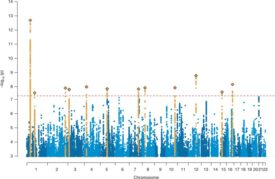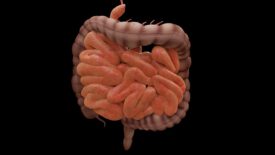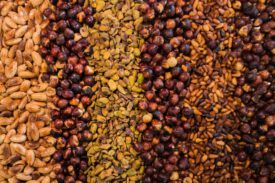Why 12 genetic markers for ADHD are exciting news for New Brain Nutrition
We are finally here: for the first time, genome-wide significant markers are identified that increase the risk for Attention Deficit / Hyperactivity Disorder (ADHD). This research was conducted by an international consortium of more than 200 experts on genetics and ADHD, and includes several researchers that are also involved our Eat2beNICE project (the scientific basis of this New Brain Nutrition website). The findings were recently published in the prestigious journal Nature Genetics and will greatly advance the field of ADHD genetics research. Main figure from the publication of Demontis et al. Here you see all genetic variants that were tested...
Changes in healthy eating: a 20-year longitudinal study in Estonia
The topic of adopting healthier diets is increasingly popular due to better awareness of issues like obesity, diet-related health problems and illnesses, and a general pursuit of better life quality. A large, longitudinal study in Estonia investigated how eating patterns have changed over the years, and which factors influence the food choices we make. The Estonian Children Personality Behaviour and Health Study (ECPBHS) is a multidisciplinary study that has been going on for already 20 years. It started in 1998, when participants were 9 and 15 year-old schoolchildren from Tartu County in Estonia. The 1176 children that were included in...
ADHD and obesity: Does one cause the other?
Attention-deficit/hyperactivity disorder (ADHD) is a common neurodevelopment disorder characterized by inattention or hyperactivity–impulsivity, or both. It might seem paradoxical, but many studies indicate that individuals with a diagnosis of ADHD suffer from overweight and obesity. Therefore, it is important to understand the underlying mechanism that put individuals with ADHD at risk for obesity. Evidence from within-individual study A systematic review and meta-analysis (1), based on 728,136 individuals from 42 studies, suggested a significant association between ADHD and obesity both in children/adolescents and adults. The pooled prevalence of obesity was increased by about 70% in adults with ADHD and 40% in...
ADHD and exercise interventions
ADHD is among the most common psychiatric disorders, with ~3% prevalence in adulthood and ~5% in childhood. ADHD has a high risk for comorbid conditions. Comorbid means that one psychiatric disorder often comes together with another psychiatric disorder. For instance mood, anxiety and substance use disorders have high comorbid rates in adults with ADHD. Adults with ADHD are also at risk for obesity and major depressive disorders and adolescent ADHD predicts adult obesity: 40% of adults with ADHD are also obese. These are worrying numbers. Many adults who have ADHD suffer from these negative consequences that come with their mental...
Dietary diversity and brain function
Every time I travel and enter the breakfast room of my hotel I think of Japan. And not just because of the curious surprises that I encountered when travelling there (once, the hotel’s definition of a ‘western style breakfast buffet’ was shrimp pasta and pepperoni pizza), but because of the relation the japanese have to their nutrition. The Japanese cuisine is said tohave a much higher dietary diversity than western cultures do. This is associated with a reduced intellectual decline at older age, as was reported by Rei Otsuka and colleagues in 2017 (among others). In other words: Daily intake...
One size does not fit all
Food is not only essential for our bodily functions, but also for our brain functioning and associated behavioural performance. Some studies have shown that eating more of a certain nutritional compound, can enhance your performance. But is it really that simple? Can food supplements support our performance? I will tell you why this is not that simple. Your food contains a range of nutrients that your body uses amongst others as energy source and as building blocks for cells. For example protein-rich food such as dairy, grains and seeds are made up of compounds called amino acids. Amino acids are...
Probiotics for Impulsivity in Adults (PROBIA): A randomized-controlled trial.
Maladaptive or uncontrolled impulsivity and compulsivity lead to emotional and social maladjustment, e.g. addiction and crime, and underlie psychiatric disorders. Recently, alterations in microbiota composition have shown to have implications for brain and social behaviors as we have been explaining in our lasts blogs. The microbiota-gut-brain axis may be involved in this process but the mechanisms are not fully identified (1). The supplementation of probiotics can modulate the microbial community and now has been suspected to contribute to ameliorating symptoms of a psychiatric disease with possible influence on social behaviors (2). To date, no randomized controlled trial has been performed...
ANIMALS ADDICTED TO FOOD HELP TO UNDERSTAND HUMANS
We know that high-energy food (rich in refined sugars and fats) is addictive and can lead to an eating addiction and to obesity. Addiction is a very severe disorder with chronical and relapsing components. People who suffer from it show compulsivity, persistence to seek the reward (food) and high motivation to overconsume in some cases. To study eating addition, we have developed a mouse model that shows persistence to eat, high motivation for palatable food and resistance to punishment in obtaining the food. We have tested these three characteristics in several genetically identical animals and selected two extreme groups: Mice...
Internal information speedway: the gut-brain communication channel
Have you experienced drowsiness after eating a large meal? Has an important presentation made your stomach turn? Seeing a special someone made you feel butterflies in your stomach? If you have (and you most likely have), then you know how strong the connection between the brain and the gut is. Scientists have found that many chronic metabolic diseases, type 2 diabetes, mood disorders and even neurological diseases, such as Parkinson’s disease, Alzheimer’s disease, amyotrophic lateral sclerosis (ALS) and multiple sclerosis, are often associated with functional gastrointestinal disorders (1). The importance of the association between the gut and the brain is gaining momentum...
Anti-inflammatory foods
What is inflammation? Inflammation is the response of the body’s immune system against external factors that can put your health in danger. When this system feels that is attacked by something that may harm your health, it activates some molecules that are called cytokines in order to neutralize or avoid any damage, so you can be safe. Why is it bad? What does it do? Inflammation isn’t a bad thing since its purpose is to protect our body, but in some cases, when the duration of this response is extended for too long- I’m talking about years – it can...









